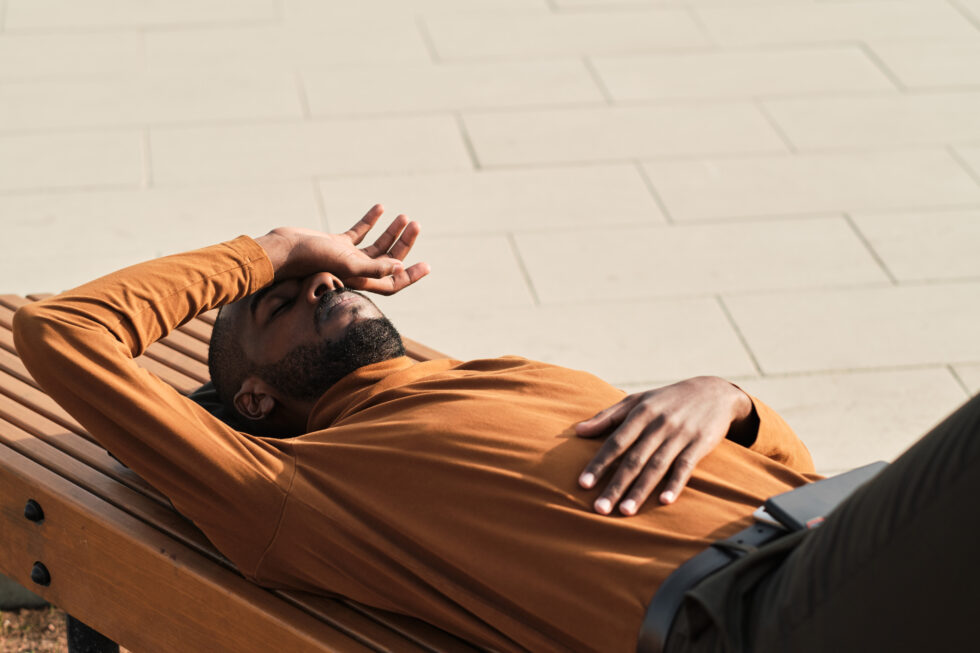The Rest Rebellion: Sleep Inequities and Rests Protests
by Makeda Robinson | May 16, 2022

Tired young African American man relaxing on wooden bench outdoors on sunny summer day.
Getting a good night’s sleep or taking a nap can reset a person’s mind, body, and psychological state. Getting the proper amount of sleep increases the body’s alertness, mood, and performance, resulting in a quicker reaction time and improved memory. However, we are not all afforded the same time or access necessary for healthy sleeping patterns.
A study by Oxford Academic shows that Black people are less likely to get the recommended seven to nine hours of sleep compared to other races. The study also found that Black people have a harder time falling asleep, wake up more often in the middle of the night, and spend less time in REM or rapid eye movement sleep. REM is a vital stage in the sleep cycle. Brain development, immune support,
and reduced fatigue are also benefits of REM sleep. This stage is where most vivid dreaming happens, causing the amygdala to activate, and our brain processes emotions. The brain also consolidates memories formed throughout the day during REM sleep. Chronic sleep deprivation has been linked to health conditions such as diabetes, depression, obesity, and heart disease.
So why is it that sleep seems like a privilege?
There are many socioeconomic and environmental factors that are contributors. Black and brown people are twice as likely to work longer hours and overnight shifts than white people. The Sleep Health Journal article #NoJusticeNoSleep, published by the National Sleep Foundation states “poor quality sleep has long been identified as a critical pathway linking lower income and lower education to increased risk for poor physical and mental health. Social factors, such as neighborhood disadvantage, neighborhood crime, lack of adequate access to equitable health and social services, housing inequality, and racial discrimination, have all been identified as contributing factors to the rise of sleep health disparities in the U.S.” In addition, people of color often live in densely populated neighborhoods that have noise and light pollution exposing people in such areas to twice as much ambient and artificial lighting, which suppresses the production of the sleep hormone melatonin. While the list of factors preventing proper sleeping habits is lengthy, there are resources and movements helping to address this issue.
Access to a safe and comfortable space to rest and its barrier to wellness led Tricia Hersey, known as The Nap Bishop, to found The Nap Ministry in 2016. She created the “Rest is Resistance” framework as a radical tool to promote the power of naps as a method of encouraging and supporting community healing. The Nap Ministry converts parks, conferences, community organizations, and even living rooms into spaces that focus on the power of rest. Hersey has used performance art, site-specific installations, and immersive workshops to convey her message.
Black Power Naps created by Navild Acosta and Fannie Sosa is an artistic movement designed to end the sleep gap, regain power, and empower people of color to both slow down and take a break from a world that is constantly on the go. Acosta and Sosa have turned theaters into welcoming, serene spaces for resting by using soft and comfortable surfaces that are enticing to the senses.
Dr. Girardin Jean-Louis, Ph.D., is the director of the Center on Transitional Sleep and Circadian Sciences and the PRIDE Institute at the University of Miami. Dr. Jean-Louis began researching sleep disparities in people of color as a postdoctoral researcher in the late 1990s. His team conducted a study that revealed that nonwhite men in San Diego were getting about an hour less of sleep on average than white men, and he wondered why. Today Jean-Louis often uses the Bible to convey his messages. He reminds those who listen to him speak in churches, hair salons, and barbershops about the importance of sleep.
These activist-aligned artistic movements are helping to raise awareness about the relationship between sleep, oppression, mental health while also protesting oppression and its role in feeding productivity for the sake of capitalism.
Love Now Media also explored the topic during a Lunch & Love panel discussion. The panel, hosted by Syreeta Martin featured Ameen Akbar, Phillip J. Roundtree and Love Now Media’s founder, Jos Duncan Asé. Listen to the discussion here.

